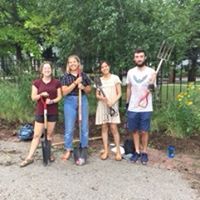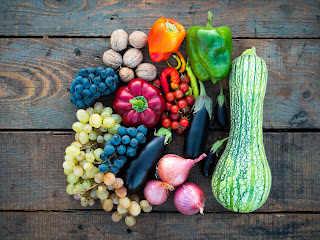What's happening with sustainability at Mac?
 |
| Photo of Sustainability Office student workers |
This blog post was originally written for MN350's blog and edited by Emily Newhall.
During this time of uncertainty, it's easy to dwell on the stalled development of climate solutions. However, we can treat this as both a time of reflection and a time to seriously strategize how to prioritize sustainability when the pandemic crisis is over. With colleges moved to online learning, many of their projects have been postponed or reworked. At Macalester College, when everything is functioning normally, the Sustainability Office organizes and convenes sustainability on campus.
Although the Sustainability Office has ever-changing projects, it consistently serves as a catalyst for action in the community and offers support for sustainability work on campus. The office is currently led by the Director of Sustainability, Christie Manning, and supported by part-time staff Alyssa Erding and student workers like myself. Much of our work is driven by six goals from Mac’s Sustainability Plan, which was created to reduce the college’s carbon footprint and advance its mission while helping reach sustainability commitments. The goals are: Carbon Neutrality, Zero Waste, Expanding Real Food offerings, Education for Sustainability, Urban Sustainability, and Sustainability and Wellness. We recently added an Environmental Justice goal, which threads through and connects the other six. But what are we and the campus doing to reach these goals?
Carbon neutral by 2025
Part of Macalester’s carbon-neutral goal is investing in energy efficiency. Mac produces renewable energy on campus from solar panels that provide 17,000 kWh of photovoltaic energy each year, and an on-campus wind turbine educates community members about wind energy. Building construction prioritizes energy efficiency through stormwater management, maximizing daylight, using recycled materials, and more. To mitigate the carbon emissions created by air travel, the Sustainability Office offers a guide for reducing emissions when traveling and facilitates opportunities to offset emissions.
Zero waste
The Sustainability Plan defines zero waste as a 90% diversion rate from the school’s total waste, meaning 90% of the school’s waste must be redistributed. One way Mac achieves this is making compost and recycling bins available in every campus building and providing drop-off sites for items like plastic bags and electronics. Mac’s cafeteria sends its food scraps to Barthold Farms in St. Francis, MN, for pig feed, which alone reduced trash by 33% in the program’s first year. A program called the Food Recovery Network packages and sends leftover food weekly to local charity Loaves and Fishes. Another way Mac is working toward zero waste is by being intentional about its purchasing power: zero waste is not only about redistributing waste, but also about reducing the creation of waste at the source. At Mac, dishware is either reusable or compostable. In 2010, Mac instituted a campus water bottle ban, helping avoid the use of 1.2 million plastic water bottles. The Sustainability Office runs a Free Swap, where members of the Mac community can drop off or take clothing, household objects, and other items for free.
Expanding real food offerings
The majority of the work being done toward the goal of “Expanding Real Food” -- food that is local, organic, humane, and fair trade -- happens in Mac’s cafeteria, which is run by Bon Appétit Management Company. Bon Appétit is committed to their Farm to Fork program that buys locally from small, owner-operated farms. Last year, 21% of food served came from Farm to Fork. The Sustainability Office also supports student organizations working on Real Food. These include MULCH (Macalester Urban Land and Community Health), which runs an on-campus garden and chicken coop in conjunction with Mac’s EcoHouse, and MacSHARE, a student-run coop that provides locally-sourced bulk foods to the Mac community.
Education for sustainability
Macalester strives to integrate sustainability into its curriculum. Every year, the Director of Sustainability offers the course Psychology of Sustainable Behavior, which engages students in real-world projects to expand sustainability on campus and in the community. Mac students have attended four UN Climate Change Negotiations as observers, reporting back to the community via blogs. Students, faculty, and staff can apply to the Sustainability Office’s small project fund to receive money toward a sustainability-related project. This year, a group of three students received funding to create a rotating exhibit of art made from waste meant to spark discussion about zero waste. Our office also collaborates with the community on climate justice and sustainability work on campus, and we engage them through the website, blog, and social media pages.
Urban sustainability
Although many of the projects described in this post collectively promote urban sustainability, Mac has many other projects dedicated to urban sustainability. For example, Mac maintains a campus pollinator path to promote this goal and, in 2016, became the first pollinator-friendly, neonicotinoid-free college in Minnesota. The Sustainability Office also collaborates with Mac’s Civic Engagement Center to connect students to off-campus opportunities with nonprofits doing environmental, social justice, or sustainability related work. Other offices at Mac connecting students to urban sustainability work include Career Exploration, Off-Campus Student Employment, and the Department of Entrepreneurship and Innovation.
Wellness
To foster the connection between sustainability and wellness on campus, the Sustainability Office works with the Laurie Hamre Center for Health & Wellness. One example of the collaboration is SustainaCup, a program begun by a Sustainability Office student worker, to provide free menstrual cups to students. We also support the Mac BikeShare program, allowing students to borrow bikes for free, as well as MacBike, which offers free bike repairs and maintenance. Our Director of Sustainability is part of a research collaboration with the Minnesota Department of Health on the mental health and well-being impacts of the climate crisis, particularly for young people. Several Mac health and wellness counselors have also advised her on this work.
Moving forward
The Sustainability Office is constantly revisioning how best to promote sustainability on campus. Recently, our office underwent structural changes to expand our scope. Moving forward, we’re working to form better connections with other organizations and departments on campus connected to sustainability, climate, and the environment, as well as expand the current work connecting sustainability with environmental justice. And, because several of the sustainability goals reach their deadline this year or are fast approaching, campus members are discussing possible future goals for Macalester. This semester the work our office did was different than we expected. As the student worker in charge of communications and media for the office, however, the remote community building and learning we facilitated inspired me and gave me hope for what we can achieve in our community next year.
Written by Macalester Sustainability Office student worker Zella Lobo


Comments
Post a Comment